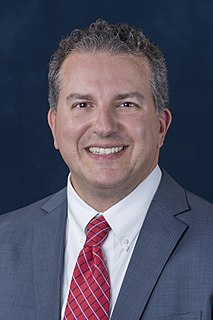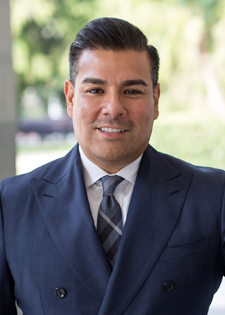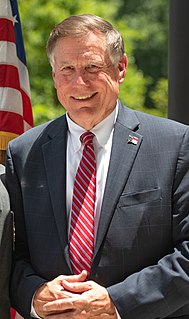Related Research Articles

A fire marshal, in the United States and Canada, is often a member of a state, provincial or territorial government, but may be part of a building department or a separate department altogether. Fire marshals' duties vary but usually include fire code enforcement or investigating fires for origin and cause. Fire marshals may be sworn law-enforcement officers and are often experienced firefighters. In larger cities with substantially developed fire departments the local fire departments are sometimes delegated some of the duties of the fire marshal.

The government of Maryland is conducted according to the Maryland Constitution. The United States is a federation; consequently, the government of Maryland, like the other 49 state governments, has exclusive authority over matters that lie entirely within the state's borders, except as limited by the Constitution of the United States.

C. Thomas Gallagher III is an American politician, financier, and insurance agent from the state of Florida and a member of the Republican Party. Gallagher holds the distinction of having served more years as an elected state official than any other individual in Florida history. He began his career in the Florida House of Representatives, where he served from 1974 to 1987.
A law enforcement officer (LEO), or peace officer in North American English, is a public-sector employee whose duties primarily involve the enforcement of laws. The phrase can include campaign disclosure specialists, police officers, prosecutors, municipal law enforcement officers, health inspectors, special police officers, customs officers, state troopers, federal law enforcement agents, secret agents, special investigators, coast guards, border patrol officers, swat officers, district attorney, bounty hunters, gendarmerie officers, immigration officers, private investigators, court officers, probation officers, parole officers, arson investigators, auxiliary officers, animal control officers, game wardens, park rangers, county sheriffs, constables, marshals, deputies, detention officers, correction officers, sworn campus police officers and public safety officers. Security guards are civilians and therefore not law enforcement officers, unless they have been granted powers to enforce particular laws, such as those accredited under a community safety accreditation scheme such as a security police officer.

The government of Florida is established and operated according to the Constitution of Florida and is composed of three branches of government: the executive branch consisting of the governor of Florida and the other elected and appointed constitutional officers; the legislative branch, the Florida Legislature, consisting of the Senate and House; and the judicial branch consisting of the Supreme Court of Florida and lower courts. The state also allows direct participation of the electorate by initiative, referendum, and ratification.

The Florida Cabinet is a body of the government of Florida comprising the Attorney General, the Commissioner of Agriculture, and the Chief Financial Officer that engages in the collective governance of the state.

The chief financial officer of Florida is an elected statewide constitutional officer of Florida. The office was created in 2002 following the 1998 reforms of the Florida Cabinet. The CFO is a combination of the former offices of comptroller and treasurer/insurance commissioner/fire marshal. The office heads the Florida Department of Financial Services and is responsible for overseeing the state's finances, collecting revenue, paying state bills, auditing state agencies, regulating cemeteries and funerals, and handling fires and arsons. In addition, the CFO has administrative oversight over the offices which handles banking and insurance regulation. The CFO is a member of the Cabinet is third in the line of succession to the office of Governor of Florida.

The Texas Department of Insurance (TDI) regulates insurers and other companies that conduct insurance business in Texas, and assists Texas-based insurance consumers. TDI was founded in 1876 as the Department of Insurance, Statistics and History.

The government of the U.S. State of Oklahoma, established by the Oklahoma Constitution, is a republican democracy modeled after the federal government of the United States. The state government has three branches: the executive, legislative, and judicial. Through a system of separation of powers or "checks and balances," each of these branches has some authority to act on its own, some authority to regulate the other two branches, and has some of its own authority, in turn, regulated by the other branches.

The California executive branch consists of elected officers and other offices and officers. The elected executive officers are:

The Commissioner of Insurance is a statewide elected office in the U.S. state of North Carolina. The commissioner is a constitutional officer who lead's the state's Department of Insurance. The commissioner also oversees the Office of the State Fire Marshal and sits on the North Carolina Council of State. The current commissioner is Mike Causey, who has held that office since January 1, 2017.

The Oklahoma State Auditor and Inspector is an elected Constitutional officer for the U.S. State of Oklahoma. The State Auditor and Inspector is responsible for auditing and prescribing bookkeeping standards of all government agencies and county treasurers within Oklahoma. The office in its current form is a consolidation of the office of State Auditor with that of the office of State Examiner and Inspector, both of which dated back to statehood in 1907. The two positions were combined in 1979 after passage of State Question 510 in 1975. Tom Daxon was the first person to hold the combined office and the first Republican as all previous occupants of either position were Democrats.
Insurance in the United States refers to the market for risk in the United States, the world's largest insurance market by premium volume. According to Swiss Re, of the $6.287 trillion of global direct premiums written worldwide in 2020, $2.530 trillion (40.3%) were written in the United States.
The government of Arizona is the governmental structure of the state of Arizona as established by the Arizona Constitution. The executive is composed of the Governor, several other statewide elected officials, and the Governor's cabinet. The Arizona Legislature consists of the House of Representatives and Senate. The judiciary is composed of the Arizona Supreme Court and lower courts. There is also local government, consisting of counties, municipalities and special districts.

The Florida Department of Law Enforcement (FDLE) is a state-wide investigative law enforcement agency within the state of Florida. The department formally coordinates eight boards, councils, and commissions. FDLE's duties, responsibilities and procedures are mandated through Chapter 943, Florida Statutes, and Chapter 11, Florida Administrative Code. FDLE is headed by a commissioner who reports to the Florida Cabinet, which is composed of the governor, the attorney general, the chief financial officer and the commissioner of agriculture. The commissioner is appointed to his position by the governor and cabinet and confirmed by the Florida Senate.
The Florida Comptroller was the state comptroller of Florida from 1845 to 2003. The Comptroller was a member of the Florida Cabinet and was elected by the Florida Legislature until 1865, when it became an elected office.

In the United States, the state police is a police body unique to each U.S. state, having statewide authority to conduct law enforcement activities and criminal investigations. In general, state police officers, known as state troopers, perform functions that do not fall within the jurisdiction of the county sheriff, such as enforcing traffic laws on state highways and interstate expressways, overseeing the security of the state capitol complex, protecting the governor, training new officers for local police forces too small to operate an academy and providing technological and scientific services. They support local police and help to coordinate multi-jurisdictional task force activity in serious or complicated cases in those states that grant full police powers statewide.
Florida Department of Financial Services (FLDFS) is a state agency of Florida. Its headquarters are in Tallahassee. In 2002 the Florida Legislature merged the Department of Insurance, Treasury and State Fire Marshal and the Department of Banking and Finance into one department, the Florida Department of Financial Services.
In the United States, each state and territory has constitutional officers who lead the state governments of the United States. These officers may be elected or appointed, depending on the position. The number and powers of state constitutional officers varies from state to state, based on the constitution and statutes of each state. State constitutional officers may reside in the executive or legislative branch, while state constitutions also establish the judicial system of the state, including state supreme courts.
The Montana State Auditor is a constitutional officer in the executive branch of government of the U.S. state of Montana. The State Auditor is elected once every four years, concurrent with the state's gubernatorial election and the U.S. presidential election. The incumbent is Troy Downing, who was first elected in November 2020 and took office in January 2021.
References
- ↑ Florida, State Library and Archives of. "Florida Governors". Florida Memory. Retrieved 2019-07-23.

